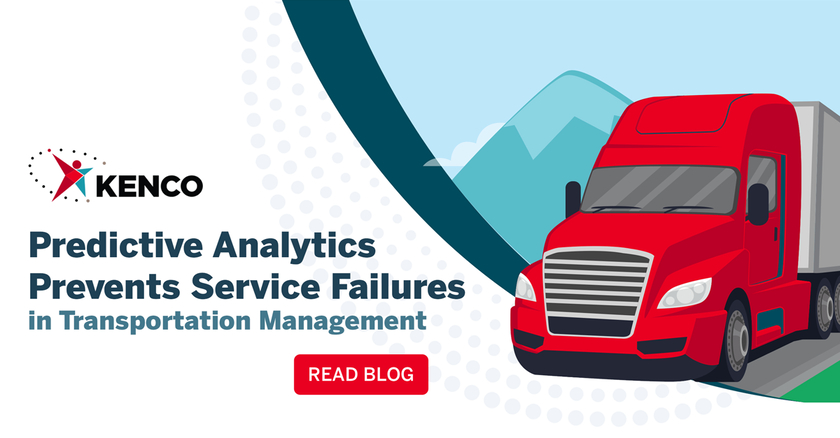Today’s strained state of freight in the supply chain, marked by high demand and tight capacity, has left more margin for service failures to arise. A service failure occurs any time a customer receives a delivery late or not at all. Several variables can lead to service failures, including inclement weather, mechanical issues, labor shortages, and dock capacity constraints. U.S. trucking company failures nearly tripled in the first year of the pandemic and remain a pervasive challenge for shippers, third-party logistics (3PL) companies, carriers, and the transportation industry as a whole in 2022.
The consequences of service failures vary in severity but affect costs, customer satisfaction, and productivity for everyone in the supply chain—shippers, 3PLs, carriers, and consumers. For shippers, your customer satisfaction suffers when consumers don’t get products on time. The same goes for 3PLs. Carriers, too, are subject to penalties in the event of a service failure and risk losing future business. On the consignee side, consequences can range from irritation all the way to needing to shut an entire production line down and send employees home because a part needed to run the line wasn’t delivered on time.
This means on-time performance is key in today’s transportation climate, and it is imperative that shippers have a toolkit that sets them up for success.
How Predictive Analytics Predict and Prevent Service Failures
Manual planning that worked in the past simply won’t cut it in today’s landscape. The amount of real time data from multiple sources needed to optimize operations and move product quickly won’t fit into a spreadsheet anymore—it requires advanced, artificial intelligence-enabled technology. Enter: predictive analytics.
Predictive analytics utilizes data, statistics, and machine learning technologies to inform shippers about potential risks before they become problems. The advanced insights provided add a level of awareness and decision support to drive better results.
At Kenco, we use a modern, cloud-based transportation management system (TMS), Kenco TMS LITE, which has predictive analytics built in, to manage freight for our customers. For further capabilities, our customers can leverage DaVinci AI, our proprietary advanced data analytics platform.
There are dozens of ways predictive analytics can be applied to prevent service delivery failures. Below are four of the technology’s key capabilities:
- Provides Insight into Market Trends
With the cost of transportation at a record high, it’s vital to be able to look at what’s happening in the market and understand trends in real time. Predictive analytics simultaneously gathers and evaluates data from thousands of sources, recognizes directions in the market, and helps determine ways to lower costs.
Predictive analytics can garner a holistic understanding of where capacity is tightening vs. loosening to understand where rates will be rising or falling up to a week in advance. That data might find cost savings in shipping on different days of the week or using an alternate route (i.e., utilizing interim points or consolidations) to move product. The technology can also perform multi-modal optimization and compare carrier contracts to see which carriers could supply the most value at the lowest cost. At Kenco, we have a dedicated multi-modal optimization part of our TMS that does nothing but compare contract rates and look at all transportation modes to find the best solutions for our customers.
- Provides Flexible Labor and Volume Planning
Predictive analytics gives invaluable insight into the workflow and timeline of the supply chain to help shippers conduct accurate labor and volume planning on a daily basis. For example, let’s say a shipper gets several purchase orders into its warehouse management system (WMS) on a Monday that need to be picked and delivered by Wednesday. As that information enters the WMS, the shipper can leverage predictive analytics to understand if they need to staff up or down for the next few days. The same goes for dock scheduling and capacity scheduling.
- Predicts and Prepares for Equipment Failure
Trucks break down or need maintenance all the time, but it is challenging to know the detailed health of each individual truck within a fleet without advanced analytics. Equipment failure analytics can help prevent vehicle failures while out on the road. By gathering data on how often maintenance has been done on a truck (i.e., the last brake or tire change) and the condition of parts when they came off the truck, shippers can predict the lifespan of a component before it reaches failure level and plan proactive maintenance accordingly. In short, predictive analytics helps to take prior service records and part examinations and turns them into prescriptive, actionable insight.
- Streamlines from an Operational Standpoint
A transportation management system (TMS) with built-in predictive analytics can provide operations teams with a heads up that a service failure is likely to occur. The technology can analyze current or incoming inclement weather, traffic, road closures, etc. to predict that a carrier will be late to complete a delivery and allow operations teams the headway to determine an alternate strategy. Advanced analytics also takes historical data, such as past carrier performance in a specific geography, into account. Armed with this additional context, operations teams can make smarter decisions when it comes to carrier selection to prevent future service failures.
Finding the Right Partner to Implement Predictive Analytics
By providing shippers with valuable insight into market trends, labor and volume forecasting, equipment failures, and operational variables, predictive analytics helps shippers reduce service failures, cut costs, and improve efficiency and customer satisfaction. The first step to implementing advanced predictive technology is finding a trusted 3PL partner with experience leveraging AI-enabled analytics to drive business success. With our proprietary Kenco TMS LITE and DaVinci AI platforms, Kenco has made a large investment in predictive analytics technology for our customers. Our dedicated team of data scientists and technology professionals helps transform your supply chain and gain a competitive advantage. To learn more about how Kenco can help you make data-driven decisions and prevent issues before they occur, visit our Advanced Analytics page.


